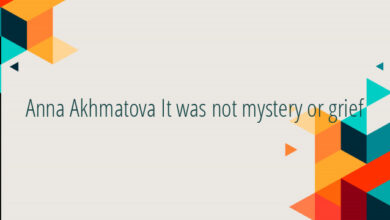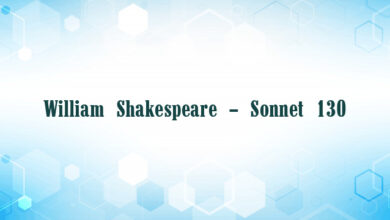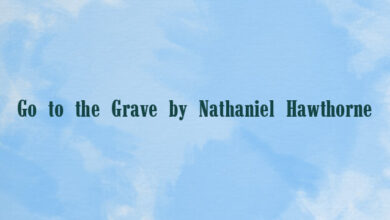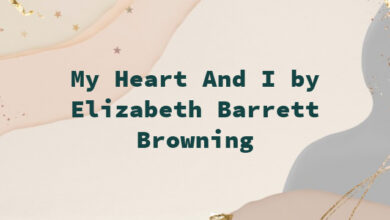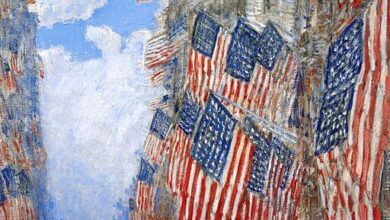
When forty winters shall besiege thy brow,
And dig deep trenches in thy beauty’s field,
Thy youth’s proud livery so gazed on now,
Will be a totter’d weed of small worth held:
Then being asked, where all thy beauty lies,
Where all the treasure of thy lusty days;
To say, within thine own deep sunken eyes,
Were an all-eating shame, and thriftless praise.
How much more praise deserv’d thy beauty’s use,
If thou couldst answer ‘This fair child of mine
Shall sum my count, and make my old excuse,’
Proving his beauty by succession thine!
This were to be new made when thou art old,
And see thy blood warm when thou feel’st it cold.
The poet looks ahead to the time when the youth will have aged, and uses this as an argument to urge him to waste no time, and to have a child who will replicate his father and preserve his beauty. The imagery of ageing used is that of siege warfare, forty winters being the besieging army, which digs trenches in the fields before the threatened city. The trenches correspond to the furrows and lines which will mark the young man’s forehead as he ages. He is urged not to throw away all his beauty by devoting himself to self-pleasure, but to have children, thus satisfying the world, and Nature, which will keep an account of what he does with his life.
The 1609 Quarto Version
WHen fortie Winters ſhall beſeige thy brow,
And digge deep trenches in thy beauties field,
Thy youthes proud liuery ſo gaz’d on now,
Wil be a totter’d weed of ſmal worth held:
Then being askt,where all thy beautie lies,
Where all the treaſure of thy luſty daies;
To ſay within thine owne deepe ſunken eyes,
Were an all-eating ſhame,and thriftleſſe praiſe.
How much more praiſe deſeru’d thy beauties uſe,
If thou couldſt anſwere this faire child of mine
Shall ſum my count,and make my old excuſe
Proouing his beautie by ſucceſſion thine.
This were to be new made when thou art ould,
And ſee thy blood warme when thou feel’ſt it could.
Commentary
1. When forty winters shall besiege thy brow,
besiege = lay siege to. A term from warfare. Forty winters (forty years) when added to the young man’s present age, would make him about 60. At such an age he would have many wrinkles, although it is generally reckoned that in Elizabethan times, owing to dietary inadequacies and disease, people aged much more rapidly, and even a forty year old could be deemed to have reached old age. So the poet could be referring to the youth as he might be when he reaches forty.2. And dig deep trenches in thy beauty’s field,
dig deep trenches The besieging army would dig trenches to undermine the city’s walls. But the reference may also be to furrows dug in a field when ploughing.3. Thy youth’s proud livery so gazed on now,
livery = uniform worn by servants in a nobleman’s house. It could be quite sumptuous, if the nobleman wished to make a show of wealth.4. Will be a totter’d weed of small worth held:
totter’d weed = a tattered garment. Tottered is an old spelling of tattered. weeds – often refers to clothing in Shakespeare.5. Then being asked, where all thy beauty lies,
being asked = if you were to be asked; in the future, when you might be asked.
lies = is; is buried; is hidden.6. Where all the treasure of thy lusty days;
lusty days = the days of youthful exuberance; days of lustful behaviour. Note that treasure contains a sexual innuendo, implying sexual parts, or semen, depending on context. Compare:
…………………treasure thou some place
With beauty’s treasure, ere it be self-kill’d. 6
Will will fulfil the treasure of thy love, 1367. To say, within thine own deep sunken eyes,
to say = to reply (to the question posed in the two lines above).
within thine own deep sunken eyes – the treasure of days long gone would show nothing surviving other than hollow eyes, caused by the process of ageing. Possibly also a hinted reference to the supposed effect of sexual excess (too much masturbation?).8. Were an all-eating shame, and thriftless praise.
all-eating shame = a shame which devours all sense of right and decorum. thriftless praise = praise which produces no result or advantage. A praise of yourself which is clearly misplaced and damaging to you.
thriftless = showing no sense of thrift, or economy.9. How much more praise deserv’d thy beauty’s use,
thy beauty’s use = the use which you make of your beauty, the profit you derive from it.
6-9. Undoubtedly a sexual meaning to these lines, especially in treasure of thy lusty days, thy beauty’s use. (See notes above) The youth is accused of expending his sexual energy upon himself, with the concomitant result of shame, exhaustion, sunken eyes and failure to point to any lasting result. See extended discussion of SonnetI10. If thou couldst answer ‘This fair child of mine
If you could reply in response to their questions, ‘This child of mine, etc., etc.’11. Shall sum my count, and make my old excuse,’
sum my count = add up the balance sheet of my life; probably a bawdy pun on count, pronounced cunt. Hence, ‘give a reckoning for all the cunts I have enjoyed’.
make my old excuse = justify my life when I am an old man; or, satisfy the arguments advanced of old, that I should produce heirs; or make my habitual, frequently repeated excuse. Shakespeare uses old in this sense in Macbeth:
If a man were a porter of hell-gate, he should have old turning the key. Mac.II.3.2-3.12. Proving his beauty by succession thine!
Proving, by his beauty, that he succeeds you as an heir to your beauty. proving also has the meaning of ‘testing, trying out’ which may be relevant here.13. This were to be new made when thou art old,
This were to be new made = this would be as if you were being newly created.14. And see thy blood warm when thou feel’st it cold.
Cold and freezing blood was thought to be the traditional accompaniment of old age. The message of the couplet is that a child made in his image would invigorate and effectively renew him when he reached old age. His blood would flow warm in his veins again.
